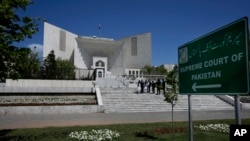Counterterrorism police in Pakistan are investigating a series of mysterious letters sent to at least 18 superior judges this week, along with a suspicious powder. No trace of those behind it was immediately identified.
Police officials reported Friday that they had increased scrutiny and surveillance of visitors and roads leading to court buildings and official residences of judges in Islamabad and provincial headquarters.
The letters came a week after six Islamabad High Court judges jointly wrote to the Supreme Judicial Council, which governs Pakistani courts, alleging persistent intimidation and interference in judicial proceedings by the country’s military-run spy agency.
The threatening letters were first received by all eight justices of the federal high court in the capital on Tuesday. The next day, four Supreme Court judges, including Pakistan’s Chief Justice Qazi Faez Isa, and six high court judges in the provincial capital of Lahore received similar letters.
Prime Minister Shehbaz Sharif pledged in a televised speech to his cabinet meeting on Thursday that his government would thoroughly investigate and solve the mystery of “the letters that were sent to various judges with a suspicious powder in them.”
An official police complaint has stated that the sender of the letters threatening judges identified itself as Tehreek-i-Namoos-i-Pakistan (the movement for the honor of Pakistan), a previously unknown group.
The text assailed the country’s “justice system” and mentioned the phrase “bacillus anthracis” with a sketch of a human skull and bones. Bacillus anthracis causes anthrax, a disease deadly to livestock and, occasionally, to humans, according to the Centers for Disease Control and Prevention of the United States.
The Pakistani English-language DAWN newspaper reported the letters threatened that the substance in the envelopes was a warning for others to “repent” or face the consequences.
Judges’ letter
In their letter to the Supreme Judicial Council a week earlier, the six Islamabad High Court judges accused operatives of the Inter-Services Intelligence, or ISI, of subjecting them and their relatives to intimidation, coercion, torture and other abuses.
They said the purpose of the intimidation was to seek favorable rulings in “politically consequential lawsuits,” including those related to jailed former Prime Minister Imran Khan.
The ISI and the powerful military have not responded to the allegations.
The allegations prompted Sharif to appoint a retired judge to a one-member special inquiry commission to probe the military’s alleged meddling in judicial affairs. But the former judge quickly recused himself, saying the Supreme Court was the right forum to investigate the matter.
The chief justice of Pakistan subsequently formed a seven-member Supreme Court bench and held a preliminary hearing on the judges’ letter Wednesday.
“We can’t just shut our eyes. It is happening. Let’s not pretend that nothing is happening,” said Athar Minallah, one of the justices on the bench, during the initial proceedings. “We have to take this thing very seriously. What [the judges] have pointed out is [the] normalization of a culture of deviance on the part of the state.”
The next hearing is scheduled for April 29.
The military in Pakistan is notorious for its suspected role in making or breaking elected governments in Pakistan. The powerful institution has staged three coups and directly ruled the country for over three decades since Pakistan gained independence in 1947.
Army generals are accused of meddling in politics even when not in power to deter efforts that could curtail the military’s largely unquestioned powers.




